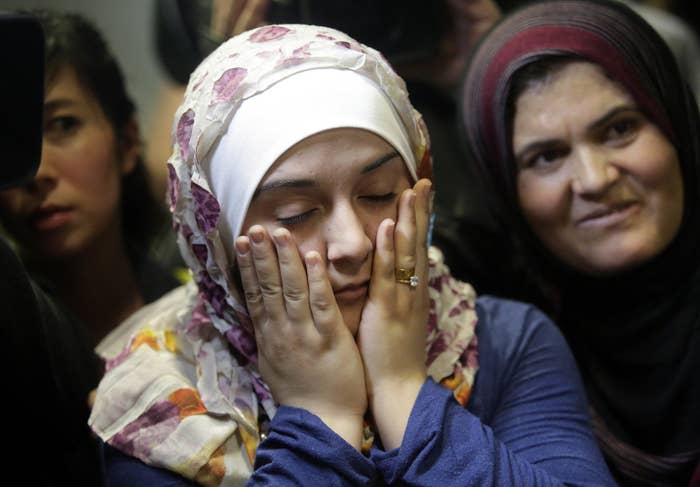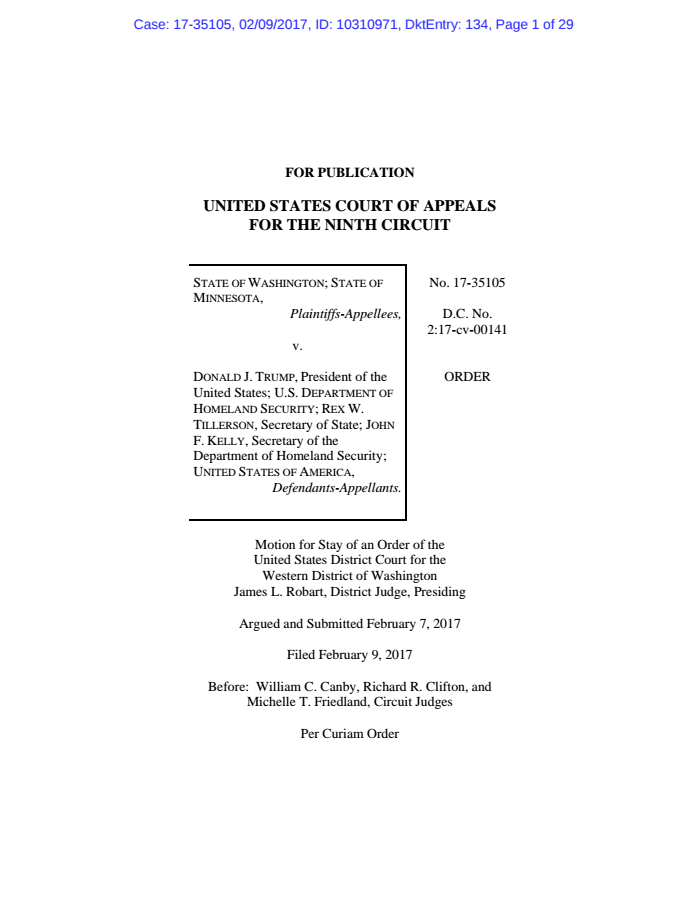
WASHINGTON — A federal appeals court denied the government's request to allow it to enforce President Trump's travel and refugee ban executive order while the case challenging the ban makes its way through the courts.
"[T]he Government has failed to establish that it will likely succeed on its due process argument in this appeal," the US Court of Appeals for the Ninth Circuit ruled in an unsigned, "per curiam" order. None of the three judges hearing the case dissented from the decision.
Specifically, the court held that the Justice Department did not show it is likely to succeed on its defense of claims raised by Washington and Minnesota about the lack of due process provided to lawful permanent residents — as well as to "other persons who are in the United States, even if unlawfully" — under the president's executive order.
Because the court held in favor of the states on that point, it did not rule on the religious discrimination claim raised in the case. (At the arguments before the Ninth Circuit earlier this week, Judge Richard Clifton expressed skepticism about the religious discrimination claim.)
Notably, it was in this portion of the decision that the appeals court addressed the question of whether the states could introduce Trump's various comments "about his intent to implement a 'Muslim ban.'"
The court noted that "[i]t is well established" that such evidence can be introduced in equal protection and Establishment law challenges — likely a signal to the Justice Department, which argued against its inclusion, and to other courts about the Ninth Circuit's view of the matter. Nonetheless, to the extent the language goes beyond a restatement of existing law, the language is not likely binding precedent, given that it was not essential to the ruling.
The court then proceeded to discuss the other portion of the ruling. "The Government has not shown that a stay is necessary to avoid irreparable injury," the court held, secondarily. "By contrast, the States have offered ample evidence that if the Executive Order were reinstated even temporarily, it would substantially injure the States and multiple 'other parties interested in the proceeding.'"
Failing to meet either of those standards, the three-judge panel ruled — in an opinion that rejected nearly all of the Justice Department's arguments in defense of the ban — that US District Judge James Robart's Feb. 3 order halting enforcement of major parts of the ban would remain in place. In addition to Clifton, Judges William Canby and Michelle Friedland participated in the consideration of the Justice Department's request.
The Justice Department now could seek a stay of Robart's order at the Supreme Court, a move that would start with a request made to Justice Anthony Kennedy, who could then refer the matter to the full court. President Trump's immediate reaction on Twitter suggested that further action would be forthcoming.
SEE YOU IN COURT, THE SECURITY OF OUR NATION IS AT STAKE!
"The Justice Department is reviewing the decision and considering its options," Justice Department spokesperson Nicole Navas said in a statement.
In a news conference, Washington Attorney General Bob Ferguson said, "Bottom line, this is a complete victory for the state of Washington. We are a nation of laws. And as I have said, as we have said, from day one that those laws apply to everybody in our country, and that includes the president of the United States."
The Feb. 3 order in the lawsuit brought by Washington and Minnesota had led the federal government to begin allowing travel from the seven affected Muslim-majority countries and allowing the refugee program to continue.
The Justice Department quickly filed a request with Ninth Circuit, asking the trial court's order to be stayed, or put on hold, while the merits of the case could be hashed out in court. The appeals court heard arguments over the government's request on Feb. 7. The three-judge panel was skeptical of the government's request, with one judge from the panel also expressing skepticism of the broad scope of Robart's order.
In Thursday's decision, the court first held that Robart's order was appealable. The trial court had issued a temporary restraining order, which generally is not appealable. Washington's solicitor general, Noah Purcell, argued that the case should be sent back to the trial court so that Robart could rule more fully on a preliminary injunction, which is appealable.
The court rejected that argument, noting "the unusual circumstances of this case" — including the fact that the Justice Department has argued "emergency relief is necessary to support its efforts to prevent terrorism" — and proceeding to hold that the TRO "should be considered to have the qualities of a reviewable preliminary injunction." (Soon after the ruling, Washington filed a letter with Robart's court saying that, due to the appeals court decision, the state believed that the district court's planned consideration of the matter would not proceed.)
More broadly, though, the appeals court rejected the more pressing argument from the federal government — argued by Justice Department lawyer August Flentje — that the executive order is unreviewable by the courts.
"There is no precedent to support this claimed unreviewability, which runs contrary to the fundamental structure of our constitutional democracy," the court ruled. "In short, although courts owe considerable deference to the President’s policy determinations with respect to immigration and national security, it is beyond question that the federal judiciary retains the authority to adjudicate constitutional challenges to executive action."
The court preliminarily found that Washington had standing to bring the case — a legal argument about whether the plaintiff in a case can point to a particularized injury resulting from the action challenged. The court found that the states had standing due to their claim that they are harmed as "operators of their public universities."
This is a developing story. Please check back at BuzzFeed News for the latest news.

